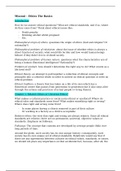Mizzoni – Ethics The Basics
Introduction
How do we answer ethical questions? What are ethical standards, and if so, where
do they come from? Think about ethical issues like:
- Death penalty
- Drinking alcohol whilst pregnant
- Etc.
Philosophical origin of ethics: questions the origin of ethics (God and religion? Or
rationality?)
Philosophical problem of relativism: about the issue of whether ethics is always a
direct function of society; what would life be like and how would human beings
behave if they didn’t live in civilized society
Philosophical problem of human nature: questions what the characteristics are of
being a human (Emotional intelligence? Rationality?)
Problem of conduct: how should I determine the right way to do? What counts as a
life lived well?
Ethical theory: an attempt to pull together a collection of ethical concepts and
principles into a coherent whole in order to answer an ethical question or solve an
ethical problem
Ethical tradition: a theory that has taken on a life of its own which has a
theoretical center that passes from generation to generation but it also stays alive
through the actions and practices of actual people (= living theory).
Chapter 1: Relative Ethics or Universal Ethics?
What makes a cultural practice or social norm ethical or unethical? Where do
ethical rules and standards come from? What makes something right or wrong?
Where does right and wrong come from?
- In some places having a clitoris removed is part of their culture
- Or working in a factory as a child is acceptable
Relative ethics: the view that right and wrong are always relative. Since all ethical
standards are relative, there are no permanent, universal, objective values or
standards. Emphasis on folkways.
Folkways: The concept that customs are developed by average people (folk) over
long periods of time.
Around the globe, each society has its own unique history; consequently, each
society has its own unique set of ethical standards. Relativists would say that if
there are any agreements between cultures on ethical values, standards, or issues,
we should not place any importance on that accidental fact, because, after all, the
, true nature of ethics is relative, and the origin of ethics lies in each society’s
unique history.
Universalist ethics: assert that not everything is relative, because some aspects of
ethics are universal. They agree that there are cultural differences and that
cultures display diversity. But universalists will also claim that only some social
practices are merely conventional; they hold that not all practices are merely
conventional. Thus they will explain that it is possible to believe that both ethical
universalism and cultural relativism are true.
Cultural Relativism: the theory that, as a matter of fact, different cultures have
different practices, standards, and values.
Arguments for ethical universalism
1. Human nature: in many sciences today (like evolutionary psychology) there
is the perception that there are universal human traits having to do with
human language, human facial expressions, the way the human mind works,
human food preferences, etc.
2. Human rationality: deny ethical relativism by asserting that humans have a
rational nature that is not shaped by their cultural surroundings, but rather,
is part of their human nature. Just as there are rules of logic and rational
thinking that are universal, some ethical universalists say that there are
ethical rules that are universal.
One of the attractions of ethical relativism is that people believe it is a call for
tolerance. The emphasis is on the differences between human ways of life and
there doesn’t seem to be one way of life that is the right way of living. It seems,
then, that relativism would imply that we should tolerate other people who have
different ways of living than we do (‘When in Rome do as the Romans do’).
Chapter 2: Virtue Ethics
How could an emotion – anger – prompt a person to go to great lengths, such as
getting into a fight?
Virtue ethics: questions how emotions are related to actions and how human
beings have the ability to control their actions, and, in the process, gain happiness
for themselves.
Socrates, Plato, and Aristotle all agreed that basic questions about ethics cannot
be answered without also answering questions about human nature. Essentially
the saying ‘know thyself’ pertains the philosophical problem of human nature.
Socrates made it his mission in life to examine and question whether he and his
fellow Athenian citizens were living good, virtuous lives.
The first thing we must come to grips with in virtue ethics is ‘what is a virtue’?





